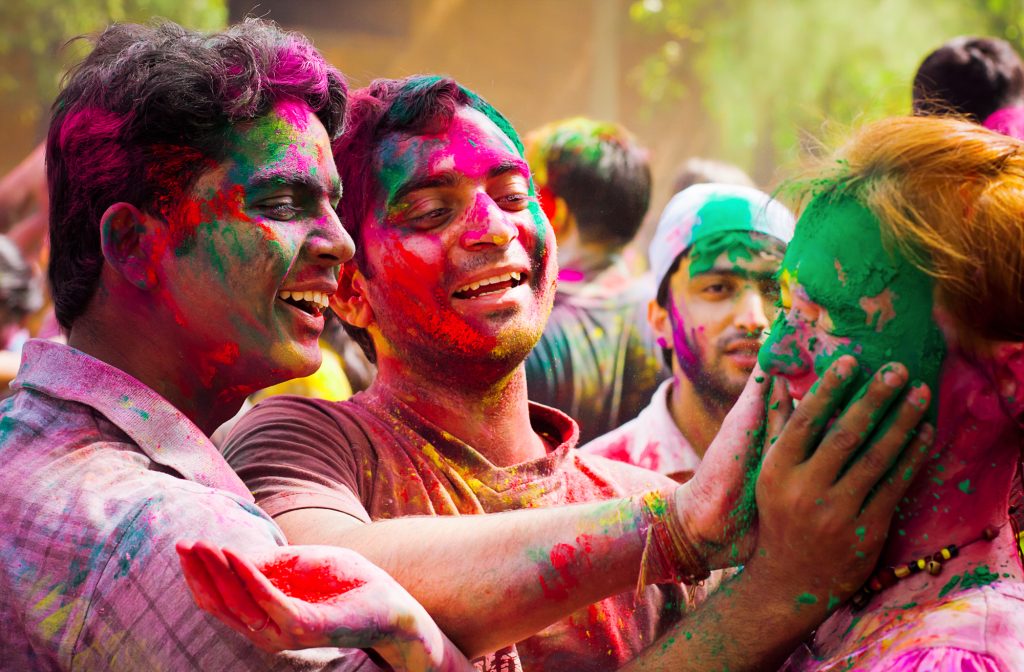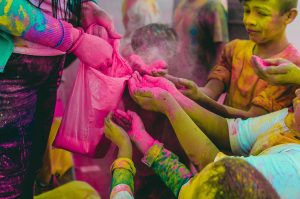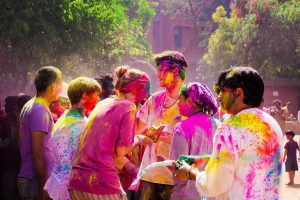- 833-265-6771
- [email protected]
- Mon - Fri: 8:00 - 5:00 EST

Celebrating the vibrant joy of Holi embraces the arrival of spring, commemorates the triumph of good over evil, and strengthens unity within communities. Let’s talk about all things Holi.
Holi is a colorful Hindu festival celebrated mostly in India and Nepal. It is also known as the “Festival of Colors” or the “Festival of Love.” Overall, Holi is a time of joy, where people come together to celebrate the beauty of life and the bonds of friendship and community.
Holi is also widely known as the “Festival of Colors” because of the exciting tradition of throwing color powder and water during celebrations. The festival transforms streets, parks, and people themselves into an unforgettable blend of vivid colors.

Holi is celebrated for several reasons, rooted in Hindu mythology, cultural significance, and seasonal observances. One of the central themes of Holi is the triumph of good over evil. The festival commemorates the legend of Holika, the sister of the demon king Hiranyakashipu.
According to Hindu mythology, Hiranyakashipu was granted a boon that made him invincible. However, his son Prahlada remained devoted to Lord Vishnu, defying his father’s commands.
In a bid to kill Prahlada, Hiranyakashipu’s sister Holika, who was immune to fire, sat with Prahlada in a pyre. But with the grace of Lord Vishnu, Prahlada emerged unharmed while Holika was burnt to ashes. Holi celebrates the destruction of evil forces symbolized by Holika’s demise.
Holi is associated with the divine love of Lord Krishna and Radha.
Holi also marks the arrival of spring, a season of renewal, rejuvenation, and new beginnings. The festival is a joyful expression of gratitude for the abundance of nature and the promise of new beginnings.
Holi transcends social barriers and promotes unity, harmony, and inclusivity. People from all walks of life come together to celebrate. It is a time to mend broken relationships, forgive past grievances, and reconcile with others, fostering a sense of community and togetherness.
Holi is celebrated on the full moon day (Purnima) of the Hindu lunisolar month of Phalguna, which usually falls in February or March according to the Gregorian calendar.
The exact date of Holi varies each year based on the Hindu calendar, as it is determined by the lunar cycle. In 2024, Holi is on March 25th. However, it’s important to note that the date may vary slightly depending on the region and local customs.
Holi is mainly celebrated by Hindus, who make up the largest religious group in India. In addition to Hindus, Holi is also celebrated by Sikhs, Jains, Buddhists, and other communities in India and around the world.
While the religious significance of Holi may vary among different faiths, the festival is widely embraced as a cultural celebration of spring, love, and the triumph of good over evil.
Holi has a rich history dating back thousands of years. It’s steeped in Hindu mythology and cultural traditions. Over time, Holi has evolved into a vibrant celebration embraced by people of various backgrounds, not just Hindus.
Regional variations add unique flavors to the festivities, making Holi a colorful and cherished part of Indian culture and heritage.
People celebrate Holi in several ways, depending on cultural traditions, regional customs, and personal preferences. However, several common elements are typically associated with Holi celebrations:
One of the most prominent features of Holi is the playful throwing and smearing of color powder and water. Participants gather in open spaces, streets, or parks, armed with bags of color powder and water guns, and engage in lively color fights.
This symbolizes the triumph of good over evil, the arrival of spring, and the celebration of life’s vibrancy and diversity.
The festival often begins with Holika Dahan, also known as Choti Holi, which takes place on the evening before the main day of Holi. People gather around the bonfire, sing songs, perform prayers, and participate in rituals to seek blessings for prosperity and protection.
Bonfires are lit to symbolize the burning of Holika, the demoness, and the victory of righteousness over evil.
Holi is a time for feasting and sharing delicious food and sweets with family and friends. Traditional Indian delicacies like gujiya (sweet dumplings), mathri (savory snacks), Puran Poli (sweet flatbread), and thandai (a spiced milk drink) are enjoyed during Holi celebrations. Sharing food symbolizes love, unity, and the spirit of togetherness.
Music and dance are integral parts of Holi celebrations. People gather to sing traditional Holi songs and dance to drums and music. Bollywood Holi songs are also popular during the festivities, adding to the joyful and festive atmosphere.
Holi is a time to mend broken relationships, forgive past grievances, and reconcile with others. People exchange hugs, greetings, and well wishes, letting go of animosities and embracing the spirit of love and harmony.
Community events are organized where people from all walks of life come together to celebrate the festival with joy and enthusiasm.
Holi is primarily celebrated in India, where it originated, and holds significant cultural and religious importance. It is observed with great enthusiasm throughout the country as one of the most widely celebrated festivals in India.
Outside of India, Holi is also celebrated in other parts of the world, especially in countries with significant Indian diaspora communities. Moreover, Holi has gained popularity in many Western countries.
In these places, Holi is celebrated by Indian communities and also embraced by people from other backgrounds who appreciate its vibrant colors, joyful atmosphere, and cultural significance.
Holi is celebrated in the US for several reasons. Firstly, it provides an opportunity for Indian Americans and others who appreciate Indian culture to connect with their roots and celebrate their heritage.
Holi’s popularity in the United States has grown significantly due to the country’s increasing cultural diversity and openness to embracing traditions from around the world.
Additionally, Holi’s themes of joy, unity, and the triumph of good over evil resonate with people of all backgrounds, making it a universally appealing festival.
In many cities across America, Holi celebrations also serve as platforms for cultural exchange, promoting understanding and appreciation of Indian culture among diverse communities.
Overall, celebrating Holi in America allows people to come together, enjoy the vibrant colors, and share in the spirit of love and camaraderie that define this festive occasion.
If you’re in a place with a significant Indian community, attending a traditional Holi celebration is the best way to experience the festival. Look for events organized by local temples, cultural organizations, or communities where you can participate in rituals, play with colors, enjoy music and dance performances, and savor delicious Holi delicacies.

If you have the opportunity, traveling to India during the Holi festival is the best way to experience the celebrations in cities like Mathura, Vrindavan, or Varanasi. Participate in temple ceremonies, observe local customs, and immerse yourself in the festive atmosphere.
Many cities around the world host Holi festivals or events inspired by the Indian tradition. These festivals often feature live music performances, DJ sets, dance parties, and of course, color powder throwing.
If you can’t attend physical events, consider participating in virtual Holi celebrations. Many organizations and communities host online Holi events, where you can join live music performances, interactive workshops, and virtual color-throwing sessions from your home.
While Holi’s traditional significance is deeply rooted in Hindu mythology, its spirit of joy, harmony, and inclusivity has made it a festival that is embraced by many people regardless of their religious beliefs.
In modern times, Holi has become an occasion for people to come together, forget differences, and celebrate the vibrant colors of life.
Recognizing and respecting the cultural and religious significance of Holi involves understanding its history, and religious and cultural meanings, and participating in the festivities in a manner that honors these aspects. Here are some ways you can do so:
Learn about the significance: Take the time to research and understand the origins and significance of Holi in Hindu mythology and culture. Learn about the stories behind the festival and the symbolism of colors.
Participate with reverence: Approach Holi celebrations with respect and reverence for cultural and religious significance. Participate in rituals and customs with sincerity and understanding.
Respect traditions: Follow traditional practices and customs associated with Holi, such as wearing white clothes, applying gulal (color powder) gently, and exchanging sweets and gifts with friends and family. Respect the timing and sequence of rituals and events during Holi celebrations.
Be mindful of others’ beliefs: Recognize that Holi holds different meanings for different people, and be sensitive to the religious and cultural beliefs of others. Avoid behaviors that may be disrespectful or offensive to others’ religious sentiments.
Don’t appropriate Indian culture: Don’t stick bindis on your face or wear a “belly dancing” skirt, or henna tattoos. Such actions can be seen as disrespectful and offensive.
However, if your Indian friend has invited you to a traditional celebration and offered you an outfit (or given you suggestions on what to wear), it’s a gesture of respect to follow their guidance. Wearing Indian attire upon request shows that you value and honor their cultural traditions.
Whether you celebrate amidst the bustling streets of India, within your community, or in the comfort of your own home, Holi leaves an indelible mark on the heart, reminding us of the beauty of life’s diversity and the power of love and togetherness.
One Response
What a fantastic guide on how to celebrate Holi! 🎉🌈 These tips make it easy to plan a colorful and joyful celebration with friends and family. From playing with vibrant colors to enjoying delicious sweets, this article has everything covered to make Holi unforgettable. Can’t wait to put these ideas into action! 🕺💃 #Holi #CelebrationTips #FestivalOfColors